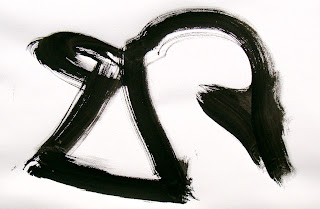 I met him down on Park Point at the beach (circa 1990). I'd brought my young children to the lake to play in the sand and to give my wife an evening free from the demands of infants. Parenting is a shared responsibility.
I met him down on Park Point at the beach (circa 1990). I'd brought my young children to the lake to play in the sand and to give my wife an evening free from the demands of infants. Parenting is a shared responsibility.He grabbed my attention the moment I saw him. He came directly toward me, hobbling across the sand, one leg withered and the second strong and muscular. He was old, somewhat stooped, wearing shorts and a button down shirt which he removed as he approached the water.
I was reading a book at the time, watching the kids, lying on a blanket in the late evening sun.
Like a great sea lion Ralph lolled into the lake and submerged himself in the icy waters, bobbing there inelegantly for near twenty minutes after which he returned to land, picked up his belongings to begin the slow trek back to his car. As he neared me he slowed, then stopped. “You like to read,” he said with that thick tell-tale accent of Eastern Europeans. I told him I did, and we struck up a conversation. He said he loved libraries when he was growing up. At some point I told him that I was a writer and he replied that he’s been told many times that his life story should be written.
I could tell he was earnest. He said he’d grown up in Estonia, outside Tallin on the Baltic Sea. Now in his seventies, he teased me with a story. “Would you like to hear how learning new languages saved my life? Come to my apartment and I will tell you more.”
* * *
 Ralph Kand was born during Estonia's War of Liberation on August 7, 1919. As a growing boy he lived with his father, mother and brother on the outskirts of Tallin, the capital city of Estonia.
Ralph Kand was born during Estonia's War of Liberation on August 7, 1919. As a growing boy he lived with his father, mother and brother on the outskirts of Tallin, the capital city of Estonia.When Ralph was three years old he fell off a fence post and broke his hip. As a result he became crippled in his left leg which grew spindly and crooked. The rest of his life he would walk with a limp, and would never run again.
Even so, Ralph had a very strong will and worked hard at whatever he put his mind to. He never gave up. When he learned typing, he practiced and practiced until he became the second fastest typist in Estonia.
The winters are long and cold in Estonia. When he was a teenager, he saw other children skiing and wanted to ski, too. Everyone in Estonia learns to ski. Ralph would not be stopped. He rigged a set of skis so that his crooked left leg and foot would be strapped in place. He loved swooshing down the mountainsides and became a very fast skier.
While Ralph was growing up Estonia was an independent country with more than a million people living in freedom. Ralph especially loved reading and spent countless hours in the library. One of his favorite authors was Thomas Mann, whose Magic Mountain made an impression on him. He often thought about Hans Castorp, studying the night sky and asking, "How high is high? How far is far?" as he contemplated the meaning of life. These were thoughts and images that stayed with Ralph the rest of his years.
* * *
Within the week of our meeting I visited Ralph in his Duluth apartment to hear the first of the stories which he had hinted at on the beach. It was the beginning of a friendship that lasted years. He had come to Duluth because his wife needed to be placed in a nursing home. He desired to be near Lake Superior because it reminded him of his homeland on the North Sea. What follows is the first story Ralph told to me.
I was employed by a brewery (in Tallinn) called The Rooster. It had been built by the French in an earlier time and was located on the hillside facing the sea. I worked at the order desk. My job was to type up the paperwork when orders were placed.
One day the Russians decided to whitewash all the windows in Tallinn that faced the sea. It was assumed that the Russians did not want Estonians to be able to see the naval activity in the harbor. They were afraid of spies. The inside of all the windows of the brewery had been painted white as well. The next day I took my thumbnail and scratched a tiny hole in the whitewash so we could watch the Russian navy ships in the bay. All over Tallinn people did the same.
The thing that made living under the Communists so terrible was that you could never feel free, never feel safe from fear. There was always the possibility that the secret police would one day come after you. My friends said that I had nothing to fear because of my bad leg.
Ralph's friends, it turned out, were wrong. Ralph was working, typing up paperwork, when it happened. He was in charge of the order desk.
Installments of Uprooted will continue each Saturday till there are no more stories to tell or the well runs dry, whichever comes first. That should be quite some time from now.